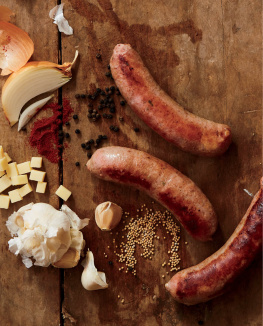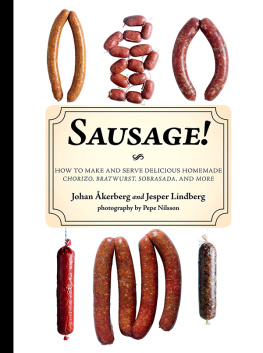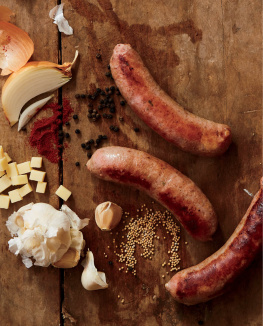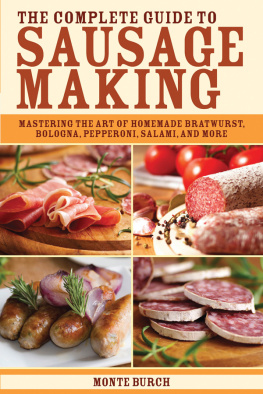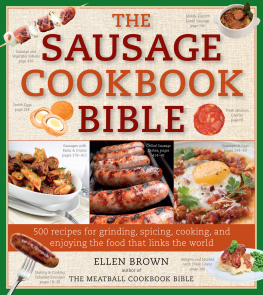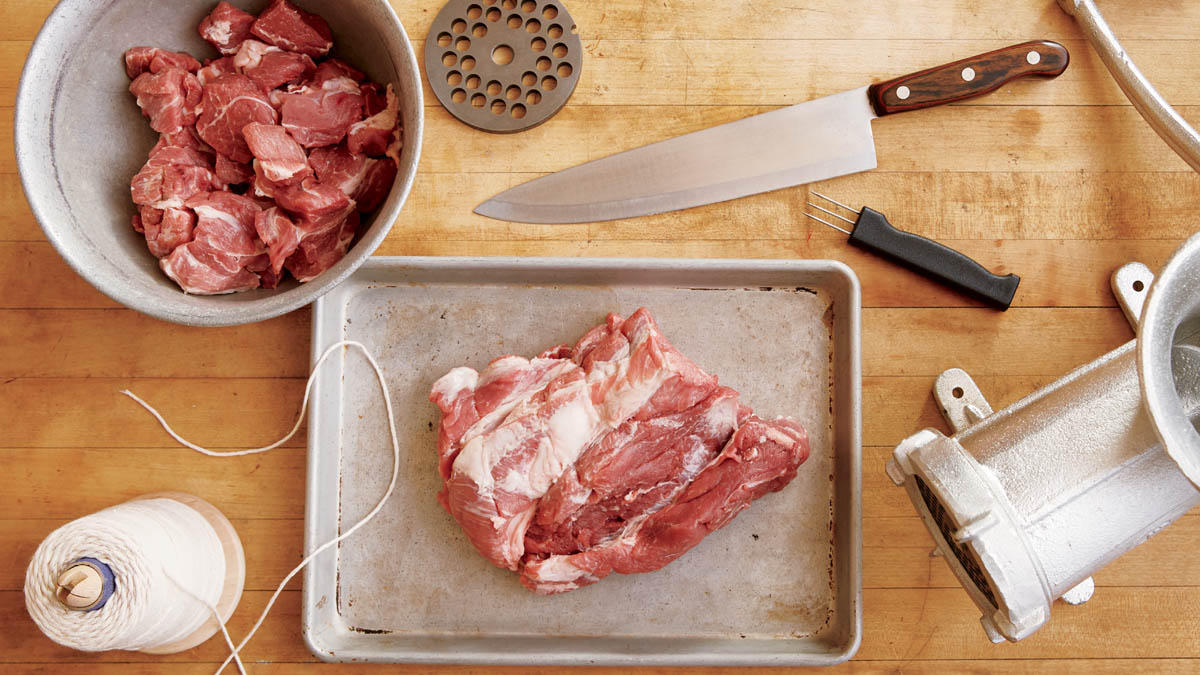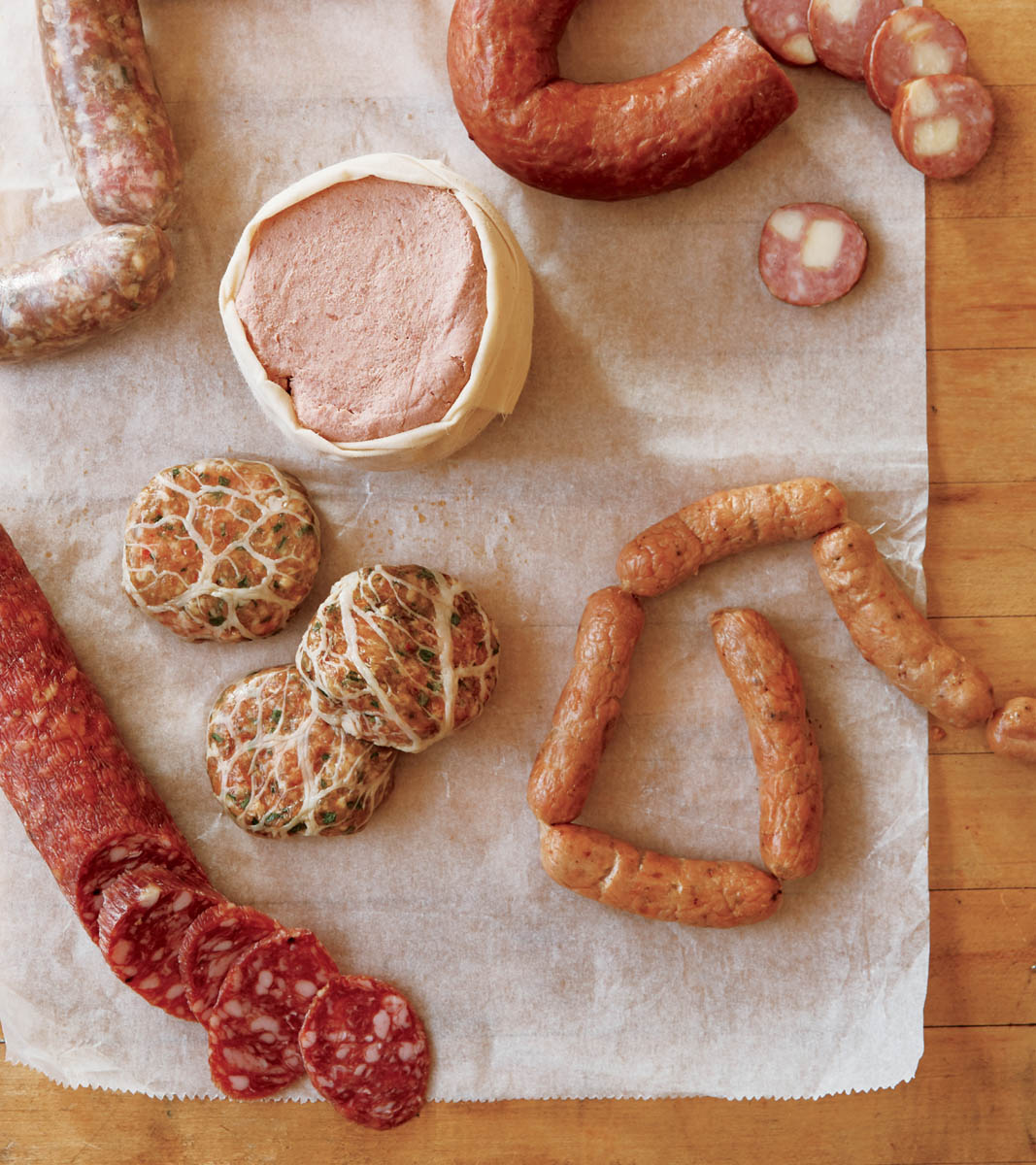Contents
Preface to the 4th Edition

Like the first person to eat an oyster, historys first sausage maker is anonymous. But we owe this person a great debt, for sausage is up there with wine and cheese and bread as one of the worlds greatest foods. Its more than just a way of preserving meat and using up the scraps just consider all the myriad ways you could do that and not end up with sausage. Its also intrinsically satisfying in its shape and form and texture (or mouthfeel), which somehow cuts across all walks of life to please every type of eater omnivore, pescatarian, poultry preferrer, and vegan alike and manages to be an ideal vessel for flavor in all its forms. How else to explain the popularity of sausages that venture far from their origins, be they made with pork, beef, oysters, alligator, or tofu. Just think: Sausage has been made for centuries in a great many cultures and countries around the world, with great variation and ingenuity in taking advantage of local conditions and ingredients.
This book is well suited for sausage makers of all skill levels. If you have never made sausage before, this book will walk you through the steps to do so successfully and confidently. With even minimal equipment, anyone can make a simple fresh sausage: Its sort of like meatloaf stuffed into a casing (or, much more simply, formed into a patty). If you choose the traditional route, invite family and friends to pitch in; creating an assembly line of the various steps will make the process (from butchering to grinding to stuffing and cooking) that much easier and more enjoyable.
Even the more experienced sausage makers will find inspiration among the recipes for 100 different types of sausages everything from classic fresh pork or poultry sausages to old-world cured and smoked specialties, and in this edition, a selection of sausages with up-to-date flavor profiles. Game sausage using elk, venison, boar, and rabbit (among other creatures) will please hunters even those of the armchair variety. (Come to think of it, that first sausage maker might well have been a hunter faced with hundreds of pounds of woolly mammoth, yards of intestines, and the prospect of a long winter and an expansive family to feed.) There are also sausages made with seafood as well as utterly delicious ones that are vegetarian.
Once you get the hang of sausage making, theres no turning back. Youll find excuses to put your skills to excellent use anytime you can. Befriend a local farmer and youll have a steady supply of quality pastured meats with which to hone your craft. Let your own ingenuity be your guide in improvising on the basic formula, knowing that youre in good company.
The years since this book was first published have seen an explosion of interest in ethnic foods and flavors. People have focused on sausage as both an old-fashioned favorite and a satisfying food with great flavor possibilities. In retail markets, sausage sales have boomed, and the number of home sausage makers has also risen, inspired by the resurgence of old-world, small-batch products that are popping up at farmers markets and specialty grocers across the country. People want sausage that is both tasty and healthful, and that is made with meat that is responsibly raised. When you make your own sausage, you can ensure that your product also passes muster.
In this edition, contributions from sausage makers in the United States have resulted in added recipes for ramp and caraway pork sausage, venison and lamb cevapi, and Moroccan goat sausage, just to mention a few. We hope these recipes inspire you to try your own variations.
Evelyn Battaglia and Charles Reavis
part 1
The Basics
1
Sausage 101
Everything has an end except a sausage, which has two.
Danish proverb
Sausage was born of necessity, a way of preserving meat in times of plenty to eat when life turned lean. The fact that it tasted good, made efficient use of a slaughtered animal, and could be seasoned and shaped according to the sausage makers taste meant sausage was a real keeper in the larder, right next to cheese, wine, beer, dried lentils, and other staples.
The word sausage comes to us by way of the Middle English sausage and the Old French saussiche, all from the Latin word salsus, meaning salted. The ancient Romans served highly seasoned sausages at every festive occasion. Not only did the salt, pepper, spices, and fat enhance the flavor, but they also helped to preserve the sausages, while the intestines into which the ingredients were stuffed helped to keep out microbes. Sausages that werent consumed immediately were smoked or left hanging in the hot, dry Mediterranean winds.
Homer mentioned the Greeks love for grilled sausage in the Odyssey. The legionnaires of Imperial Rome wouldnt march without their little bottles of garum (a fermented fish sauce) and long strings of dried or smoked sausages.
Sausage making really took off in Europe during the medieval period, when an energetic spice trade and returning Crusaders brought exotic seasonings and new cooking techniques to sleepy farms and villages. Medieval towns all across Europe Bologna, Frankfurt, Vienna, and many others gave their names to distinctive sausages that are still enjoyed today.
In North America, Native Americans dried and smoked venison and buffalo meat to make jerky, and they stuffed meat, suet, and berries into skins to make pemmican (see ).
Part of the original portable feast, sausage still delights our palates. It is a sturdy, nourishing comfort food, a link, so to speak, to the past. Today, homemade sausages are still popular among hunters, who like to make good use of the wild game they bring home. People who raise livestock also turn to sausage as a delicious way to make economical use of their animals at slaughtering time. But as our recipes will demonstrate, you can live in a tiny city apartment and shop in a supermarket and still make your own tasty, distinctive sausage. Its true: Sausage making is for everyone.
Types of Sausages
There are literally thousands of varieties of sausage in the world, but in the inimitable words of the United States Department of Agriculture (USDA): Sausages are either ready to eat or not. Indeed, the USDA groups sausages into two types: uncooked, including fresh bulk sausage, patties, links, and some smoked sausages; and ready to eat, including dry, semidry, and/or cooked sausages.
Classifying sausages into categories is difficult because sausages are produced by so many different methods. Following is a simple classification of various types and how they should be stored and cooked.

